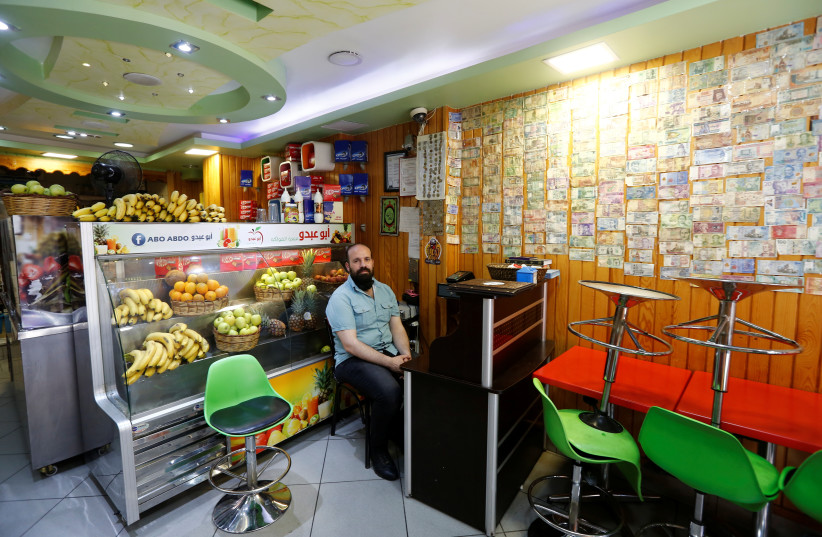Turkish President Recep Tayyip Erdogan’s announcement that he plans to return 1 million Syrians to their homeland is an election tactic to boost support, analysts told The Media Line.
Atilla Yesilada, an Istanbul-based analyst and economist, told The Media Line that the plan is a change in Erdogan’s previous position that he would not send refugees back to Syria.
“The fact that he's changing his stance might mean that he's heading for early elections or that he too has sensed the polls are turning rapidly against him,” Yesilada said.
Elections in Turkey currently are scheduled for June 2023.
On Monday, Erdogan denied that Turkey would force Syrians to return home but also said that his country has built 200,000 homes in northern Syria for those who go back, according to Turkey’s state news agency.

The Turkish president added that more than 20,000 Syrians have been deported for not following rules in Turkey.
Erdogan announced last week that Turkey aimed to have 1 million Syrians return to Syria on a “voluntary” basis and that 57,000 homes had been built so far for 50,000 families.
In March, Erdogan said his country would provide shelter to refugees, Hurriyet Daily News reported.
“We will not send [them]. We will continue to host. We are not worried about it,” he said at the time.
Erdogan made the comments about returning Syrians on a “voluntary” basis on May 3 via video link during the unveiling of new homes built in bordering Idlib province in northwestern Syria, where many internally displaced Syrian people now live.
Yesilada said he does not believe that refugees would voluntarily return, but rather would be apprehended by police and sent back.
“We’re going to see roundups of undocumented migrants, police sending Syrians to repatriation centers or expulsion centers at the slightest excuse. So, it's essentially going to be a manhunt or womanhunt and those unlucky enough to get caught by the police or other agencies will be sent back whether they want it or not,” he said.
In 2019, Amnesty International accused the Turkish government of illegally deporting refugees to Syria.
The rights group said that likely hundreds were detained and sent back, often being taken when they were walking down the street or working.
According to the UN’s refugee agency, customary international law states that refugees should not be returned to a country where their lives or freedom is at risk.
Hurriyet Daily News reported that the Turkish president said the “very substantial project” would be carried out with local governments in 13 regions.
The Turkish president has faced domestic pressure over the more than 4 million refugees living in the country but tensions have recently increased as more Afghans fleeing the Taliban find refuge in the country and the economy continues on a downward spiral.
Consumer prices have been rising amid an official inflation rate reported at nearly 70% in April but independent observers have argued that inflation is much higher.
Refugees, especially Syrians, have been blamed for taking jobs away from Turkish people by providing cheaper labor.
Recently, social media posts have spread online making claims that refugees are taking videos of women walking on the streets without their consent.
This month, a video that was commissioned by a nationalist member of parliament was posted online called “Silent Invasion,” depicting a future in which the Turkish language is under threat and Turkish people are chased in the streets.
The leader of the main opposition party, whose coalition is ahead in the polls, said in response to Erdogan’s announcement that he would also return Syrians back to their country.
In the months leading up to the 2018 parliamentary and presidential elections, the Republican People’s Party (CHP) made similar promises, including that it would cooperate with Syrian President Bashar Assad to have Syrians go back home.
“The opposition parties are hitting Erdogan where he is weakest,” said Yesilada.
He added that Turkey’s borders are porous and that he believes Erdogan’s plan is unrealistic because many would return.
“Unless something very significant, in fact, drastic is done to reduce the number of refugees in Turkey, this is going to escalate all the way toward ethnic clashes and lynchings,” Yesilada said.
Abdullah Aydogan, a political analyst based in New Jersey, says that the level of tension between the Turkish population and refugees is a major safety concern.
He said the social media videos have led to an increase in nationalist attitudes and that while there was a level of sympathy for Syrians in the past, the mood has changed as more Afghans arrive in the country.
However, he is skeptical that Erdogan would follow through on his plans to return 1 million Syrian refugees.
Aydogan believes the announcement is an election ploy and that Erdogan will change his stance after the vote.
“It should be only enough to convince some of his supporters that it is realistic,” Aydogan said. “As long as the base believes that it's realistic, it will be enough for Erdogan.”
